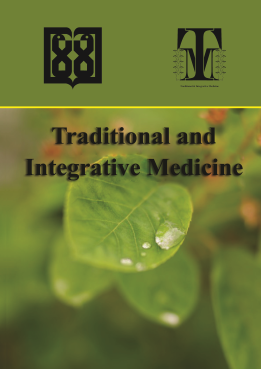Assessment of Complications Caused by the Prescription-Free Consumption of Herbal Medicine with the Purpose of Weight Gain: A Case Report
Abstract
In recent years, the common belief that herbal medications cause no side effects, have led to an increase in the consumption of these medications without prescription. Ginseng is one of the most commonly used herbs in the world and is a native of Eastern Asian countries such as China and Korea. It is also known to have several medicinal purposes. However, unreasonable use of this herb can bear consequences. In the current article, 28-year-old woman has consumed 4 capsules each day, which contained Ginseng roots, Alfalfa (Medicago sativa) extract, and Ziziphora (Ziziphora capitate) extract without a prescription to gain weight, which has resulted in serious side effects - including hepatotoxicity, psychologic, and gynecologic disorders. However, these symptoms were controlled with Chicory roots, Purslane and Jujube oxymel. PM focuses on the cooperation between food categories, nutritional instructions, food modulators, and medications. Regardless of their several therapeutic effects, medical herbs have been known to cause quite serious side effects if consumed unsystematically and without the surveillance of a doctor.
Lee JY et al. Systematic review of adverse effects from herbal drugs reported in randomized controlled trials. Phytother Res 2016;30:1412-1419.
Bodeker G, Ong C-K. WHO global atlas of traditional, complementary and alternative medicine: World Health Organization 2005.
Paik DJ, Lee CH. Review of cases of patient risk associated with ginseng abuse and misuse. J Ginseng Res 2015;39:89-93.
Blumenthal M. The ABC clinical guide to herbs. American Botanical Council 2003.
Gruenwald J, Brendler T, Jaenicke C. PDR for herbal medicines. 4th ed: Thomson, Reuters 2007.
Zhang H et al. Characteristics of Panax ginseng Cultivars in Korea and China. Molecules 2020;25:2635.
Liu X-G et al. Neuroprotective effects of triterpenoid saponins from Medicago sativa L. against H2O2-induced oxidative stress in SH-SY5Y cells. Bioorg Chem 2019;83:468-476.
Tabatabaei SM, Avatefi Hemmat M, Jalali SG, Amin G. Traditional knowledge of the use of wild medicinal plants in Chupanan rural district, north of Naein county. JIITM 2019;10:157-184.
Momen Hosseini M. Tohfe Hakim Momen. 1st ed. Nashre Shahr. Tehran 2007.
Ghannadi AR, Minaiyan M, Abed AR. Kasni (Cichorium intybus L.). JIITM 2011;1:365-372.
Gheflati A, Adelnia E, Nadjarzadeh A. The clinical effects of purslane (Portulaca oleracea) seeds on metabolic profiles in patients with nonalcoholic fatty liver disease: A randomized controlled clinical trial. Phytother Res 2019;33:1501-1509.
Salmannezhad H et al. Oxymels (Sekanjabin) in Persian Medicine: Kinds and Applications. JIITM 2015;6:116-124.
Abolhasanzadeh Z, Shams M, Mohagheghzadeh AA. Obesity in Iranian traditional medicine. JIITM 2017;7:375-383.
Mosleh G, Askari SF, Faridi P. Comparison of Drug Combination Rules in Traditional Iranian and Chinese Medicine. JIITM 2017;8:201-208.
Ardakani MRS, Farjadmand F, Rahimi R. Makhzan al adviyeh and pointing to the scientific names of medicinal plants for the first time in a persian book. Trad Integr Med 2018:186:95-99.
| Files | ||
| Issue | Vol 6, No 1, 2021 | |
| Section | Case Studies | |
| DOI | https://doi.org/10.18502/tim.v6i1.5925 | |
| Keywords | ||
| Ginseng Hepatotoxicity Drug abuse Persian medicine Case report | ||
| Rights and permissions | |

|
This work is licensed under a Creative Commons Attribution-NonCommercial 4.0 International License. |




